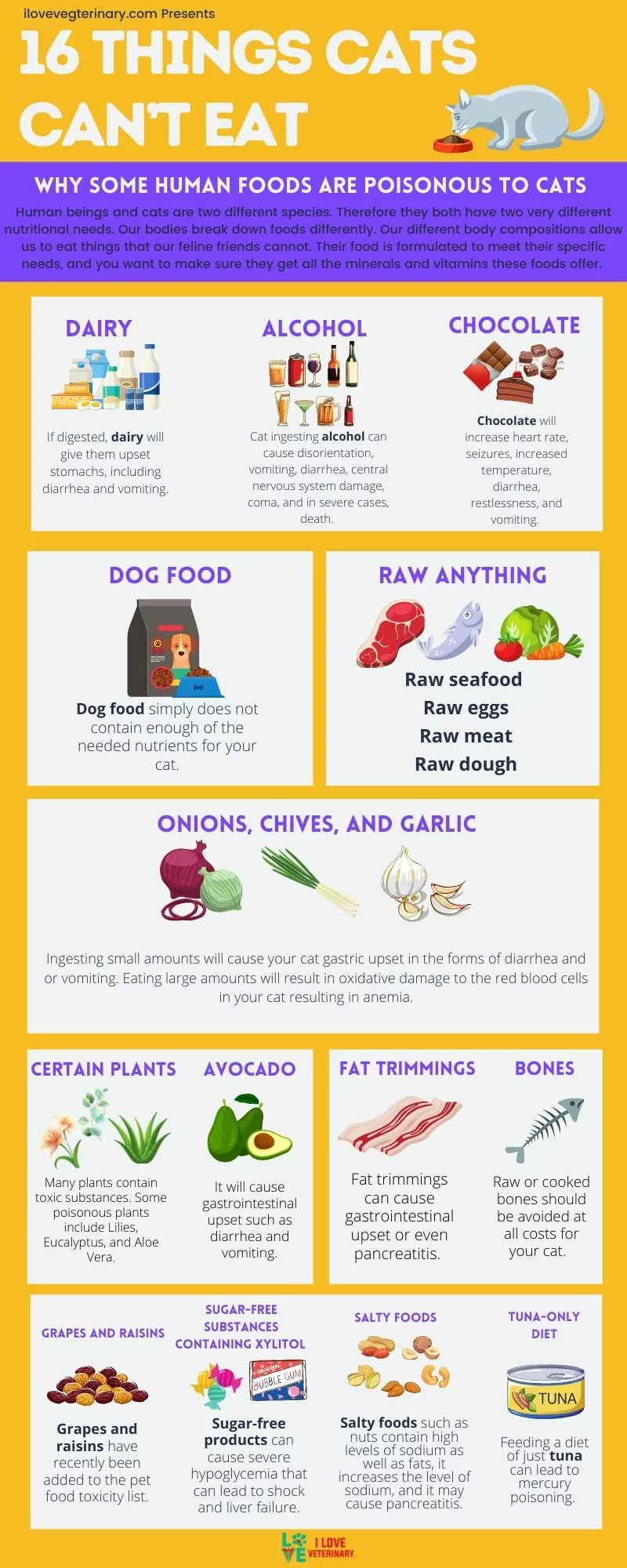Your cats meow to communicate with you, and sometimes it’s to tell you they’re hungry. Okay, most times, it’s to tell you they’re hungry. So you pour some cat food into their bowl and chop up a can of wet food.
You then look at your turkey sandwich and think, “hey, the turkey should be okay for my cat, right?” But is it? There are many things your cat can’t eat, read on to find out more!
Why Some Human Foods are Poisonous to Cats
Human beings and cats are two different species. Therefore they both have two very different nutritional needs. Our bodies break down foods differently, taking from them the nutrients we need to thrive.
Our different body compositions allow us to eat things that our feline friends cannot. Their food is formulated to meet their specific needs, and you want to make sure they get all the minerals and vitamins these foods offer.
Cats are pretty smart. They are known to turn their nose up at bad meat pieces, but certain meats do not need to be rotten to be bad for them. Below is a list of certain foods that are poisonous to cats and why.
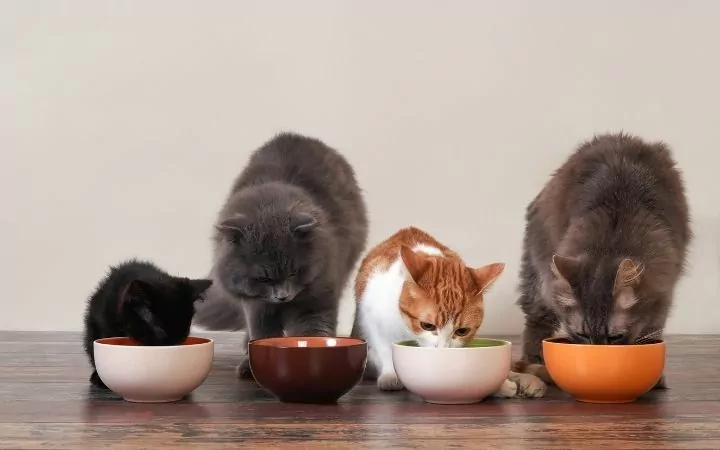
Dairy
This one particularly confuses people. See a kitten? Give it a little bowl of warm milk, right? No! In fact, it’s downright contraindicated. Cats are not equipped to handle the lactose in dairy.
If digested, it will give them upset stomachs, including diarrhea and vomiting. All dairy products should be avoided in cats, and when it comes to kittens, they should not be offered anything but their mother’s milk (until weaned) or a veterinarian approved formula.
Onions, Chives, and Garlic
Onions, chives, and garlic are all foods that should be avoided in cats. Ingesting small amounts will cause your cat gastric upset in the forms of diarrhea and or vomiting. Eating large amounts will result in much worse consequences.
Your cat’s red blood cells contain hemoglobin, and when they eat foods in the onion family, it damages it. This happens because free radicals from the food damage the cells, and the body cannot keep up with it.
With this comes the appearance of Heinz Bodies, which will be evident on a blood smear. It shows oxidative damage to the red blood cells in your cat resulting in anemia. Some clinical signs to look out for are lethargy, pale mucous membranes, reduced appetite, and dark urine.
Alcohol
Your cat may be of age, but he should indeed not partake in any alcohol consumption. Your cat ingesting alcohol can cause disorientation, vomiting, diarrhea, central nervous system damage, coma, and in severe cases, death.
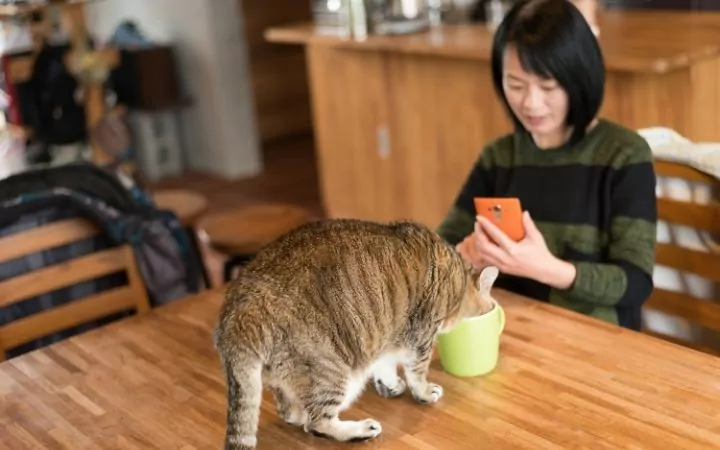
Dog food
Sure, you may think your cat eating your dog’s food is harmless, but in fact, it can result in very dire consequences. Your cat relies on an amino acid called taurine, responsible for normal vision, digestion, maintaining a healthy immune system, and muscle function (especially the heart muscle).
Dog food simply does not contain enough of this essential amino acid, making it a less than ideal diet for your cat. A taurine deficiency can result in blindness and dilated cardiomyopathy. It also does not contain enough vitamin A and arachidonic acid, which can cause skin, liver, and kidney issues for your cat.
Chocolate
Most owners are aware of chocolate toxicity in dogs, but chocolate is also toxic for cats. Chocolate contains a substance called theobromine as well as caffeine that will hurt your kitty. Diving into a candy bar will increase heart rate, seizures, increased temperature, diarrhea, restlessness, and vomiting.
It’s important to note that the darker the chocolate, the more toxic it is. This is because the darker the chocolate, the higher the levels of theobromine.
Raw anything
Raw diets are all the rage nowadays. They make their claim that our pets need to eat as their ancestors did in the wild. The only issue with this is that our pets are far from wild; they are, in fact, super domesticated.
Domestication over the years leads your pet’s bodies to change and adapt to the food and environment they are currently in. So avoiding raw meat, fish, and dough would be in your cat’s best interest.
Raw seafood contains thiaminase enzymes that break down thiamine, responsible for turning your cat’s food into energy.
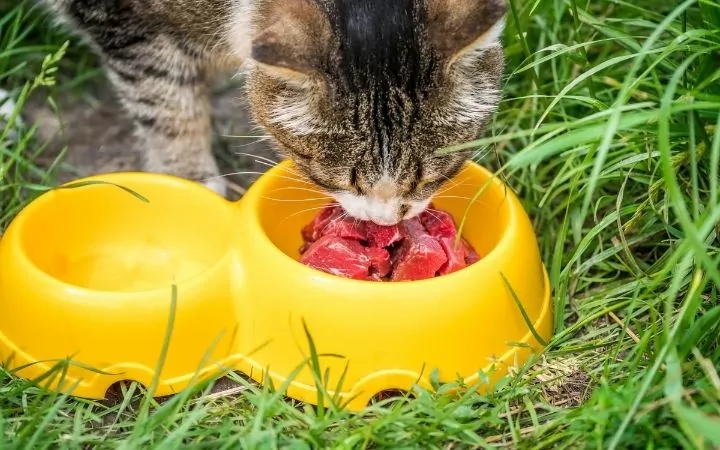
Raw eggs contain salmonella, which is a bacteria that can cause severe gastric upset. Eggs also contain a protein in the egg white called avidin. This substance eaten raw can block your cat’s intestines from absorbing biotin (another vitamin b that helps convert food to energy).
Raw meat can pose a threat to your cat because it can contain nasty parasites that can cyst into their muscle wall and wreak havoc in your cat’s body.
Raw dough should never be consumed by your cat because it can actually expand in the stomach once digested. This happens due to the active yeast in dough, which produces enough alcohol and carbon dioxide to rise. This can obstruct your cat’s stomach, leading to further issues, often requiring surgery to remove it.
Certain Plants
You may think it harmless to leave plants lying around that your cat likes to take the occasional bite off of. But, many plants contain toxic substances that should be avoided. Some poisonous plants include Lilies, Eucalyptus, and Aloe Vera.
Fat Trimmings
Fat trimmings are super greasy and contain a good amount of flavor that your cat is sure to love. But, they should not be offered for your cat to try. This is because the high-fat content contained in them can cause gastrointestinal upset or even pancreatitis (inflammation of the pancreas.)
Bones
Raw or cooked bones should be avoided at all costs for your cat. We know it’s more common for bones to be offered to your dog (give a dog a bone!), but some owners like to give them to their cats too. Cooked bones can splinter off in your cat’s bodies, and raw bones can result in a choking hazard.
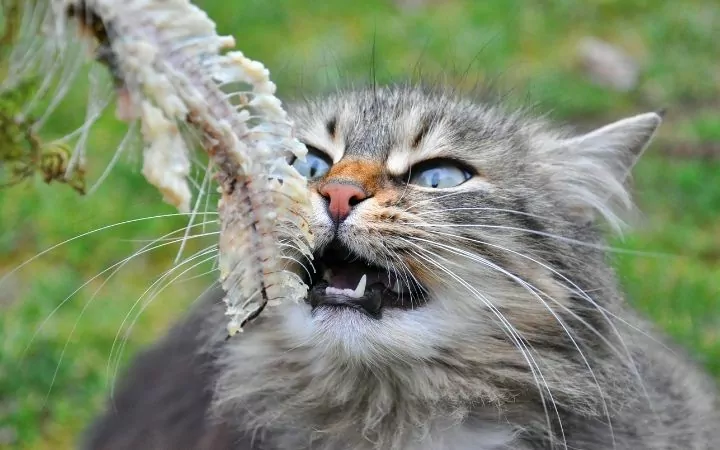
Grapes and Raisins
Grapes and raisins have recently been added to the pet food toxicity list, specifically dogs. The direct reason or ingredient is not known at this time, so it’s best to err on the side of caution and avoid it in cats as well. The scary thing is that even one grape can be enough to cause issues.
Sugar-Free Substances Containing Xylitol
Sugar-free gum, candies, and even peanut butter can contain a substance called Xylitol. Xylitol is a sugar substitute that can cause a surge in insulin to be released. This leads to severe hypoglycemia (low blood sugar) that can lead to shock and liver failure.
Avocado
Avocado is known as a superfood in today’s world. But for your cats, it’s anything but super. The toxicity comes from the substance Persin located in the avocado’s seed, skin, and tree bark. Its ingestion by your cat will cause gastrointestinal upset such as diarrhea and vomiting.
Salty Foods
Salty foods such as nuts contain high levels of sodium as well as fats. Both can lead to potential issues in your cat in the form of too much sodium, as well as pancreatitis. Macadamia nuts, in particular, can cause weakness, depression, vomiting, hyperthermia, and tremors.
Tuna-Only Diet
Tuna, like milk, is one of those things that is just associated with cats. But feeding a diet of just tuna can lead to mercury poisoning. It also does not contain all the minerals and nutrients your cat needs and therefore should not be strictly fed.
How can I Prevent my Cat From Eating Toxic Foods?
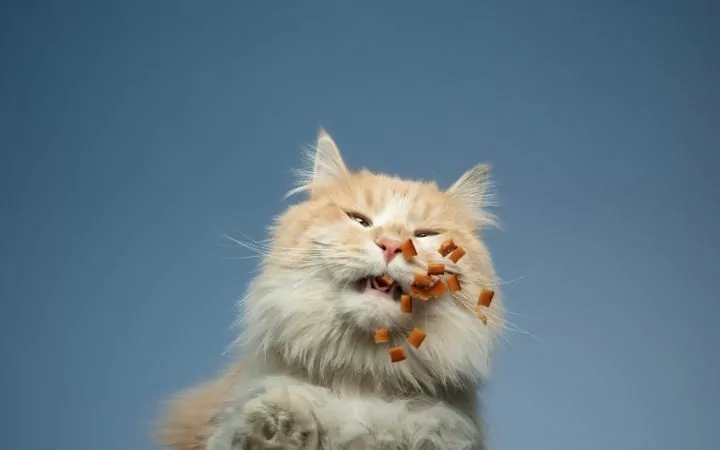
Now that we know of a few foods that are toxic from your cat, how can we avoid them? Below are some tips you can use to keep your cat safe from eating poisonous foods:
- Keep any foods not for your cat out of their reach.
- Do not allow them on the counter, especially when cooking.
- Keep them in a safe room when company is over to avoid them getting scraps.
- Make sure they do not go garbage diving.
- Do not feed them from the table.
- Keep a close watch on them during any party.
What Should I do if my Cat has Eaten What it Shouldn’t?
Of course, we always try and keep our cats safe but sometimes it just isn’t enough. If you think your cat has ingested something toxic for them, make sure to contact your veterinarian. It is also wise to keep your pet poison hotline number nearby for easy access.
Summary
Keeping our cats safe is our main priority as an owner. Of course, we love to spoil them and give them treats from time to time, but it’s essential to make sure your reward outweighs the risk.
With this in mind, make sure if your cat does get into something they weren’t supposed to, you have all the information to give your veterinarian or pet poison hotline. After all, curiosity did kill the cat.

